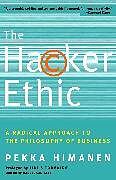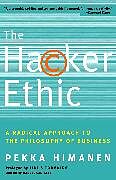The Hacker Ethic
Einband:
Kartonierter Einband
EAN:
9780375758782
Autor:
Pekka Himanen
Herausgeber:
Random House Publishing Group
Erscheinungsdatum:
12.02.2002
Zusatztext A person can be a hacker without having anything to do with computers. Pekka Himanen A thoroughly spirited and commendable framework for human creativity. Financial Times As comprehensive and instructive as any [survey] to date... Himanen has a powerful grasp on that strangely intoxicating contradiction that is open-source. The New York Times Book Review Engagingly written and provocative! and indubitably commendable in its vision of a transformation of how all of us relate to our working life....We should all be more like hackers. Salon.com Informationen zum Autor Pekka Himanen Klappentext You may be a hacker and not even know it. Being a hacker has nothing to do with cyberterrorism! and it doesn't even necessarily relate to the open-source movement. Being a hacker has more to do with your underlying assumptions about stress! time management! work! and play. It's about harmonizing the rhythms of your creative work with the rhythms of the rest of your life so that they amplify each other. It is a fundamentally new work ethic that is revolutionizing the way business is being done around the world. Without hackers there would be no universal access to e-mail! no Internet! no World Wide Web! but the hacker ethic has spread far beyond the world of computers. It is a mind-set! a philosophy! based on the values of play! passion! sharing! and creativity! that has the potential to enhance every individual's and company's productivity and competitiveness. Now there is a greater need than ever for entrepreneurial versatility of the sort that has made hackers the most important innovators of our day. Pekka Himanen shows how we all can make use of this ongoing transformation in the way we approach our working lives. Leseprobe At the core of our technological time stands a fascinating group of people who call themselves hackers. They are not TV celebrities with wide name recognition, but everyone knows their achievements, which form a large part of our new, emerging society's technological basis: the Internet and the Web (which together can be called the Net), the personal computer, and an important portion of the software used for running them. The hackers' "jargon file," compiled collectively on the Net, defines them as people who "program enthusiastically"' and who believe that "information-sharing is a powerful positive good, and that it is an ethical duty of hackers to share their expertise by writing free software and facilitating access to information and to computing resources wherever possible." This has been the hacker ethic ever since a group of MIT's passionate programmers started calling themselves hackers in the early sixties. (Later, in the mid-eighties, the media started applying the term to computer criminals. In order to avoid the confusion with virus writers and intruders into information systems, hackers began calling these destructive computer users crackers. In this book, this distinction between hackers and crackers is observed.) My own initial interest in these hackers was technological, related to the impressive fact that the best-known symbols of our time-the Net, the personal computer, and software such as the Linux operating system-were actually developed not by enterprises or governments but were created primarily by some enthusiastic individuals who just started to realize their ideas with other like-minded individuals working in a free rhythm. (Those who are interested in the details of their development may turn to the appendix, "A Brief History of Computer Hackerism," for details of their development.) I wanted to understand the internal logic of this activity, its driving forces. However, the more I thought about computer hackers, the more obvious it became that what was even more interesting about them, in human terms, was the fact that these hackers represented a much l...
#8220;A person can be a hacker without having anything to do with computers.”
—Pekka Himanen
“A thoroughly spirited and commendable framework for human creativity.”
—Financial Times
“As comprehensive and instructive as any [survey] to date... Himanen has a powerful grasp on that strangely intoxicating contradiction that is open-source.”
—The New York Times Book Review
“Engagingly written and provocative, and indubitably commendable in its vision of a transformation of how all of us relate to our working life....We should all be more like hackers.”
—Salon.com
Autorentext
Pekka Himanen
Klappentext
You may be a hacker and not even know it. Being a hacker has nothing to do with cyberterrorism, and it doesn't even necessarily relate to the open-source movement. Being a hacker has more to do with your underlying assumptions about stress, time management, work, and play. It's about harmonizing the rhythms of your creative work with the rhythms of the rest of your life so that they amplify each other. It is a fundamentally new work ethic that is revolutionizing the way business is being done around the world.
Without hackers there would be no universal access to e-mail, no Internet, no World Wide Web, but the hacker ethic has spread far beyond the world of computers. It is a mind-set, a philosophy, based on the values of play, passion, sharing, and creativity, that has the potential to enhance every individual's and company's productivity and competitiveness. Now there is a greater need than ever for entrepreneurial versatility of the sort that has made hackers the most important innovators of our day. Pekka Himanen shows how we all can make use of this ongoing transformation in the way we approach our working lives.
Leseprobe
At the core of our technological time stands a fascinating group of people who call themselves hackers. They are not TV celebrities with wide name recognition, but everyone knows their achievements, which form a large part of our new, emerging society's technological basis: the Internet and the Web (which together can be called the Net), the personal computer, and an important portion of the software used for running them. The hackers' "jargon file," compiled collectively on the Net, defines them as people who "program enthusiastically"' and who believe that "information-sharing is a powerful positive good, and that it is an ethical duty of hackers to share their expertise by writing free software and facilitating access to information and to computing resources wherever possible." This has been the hacker ethic ever since a group of MIT's passionate programmers started calling themselves hackers in the early sixties. (Later, in the mid-eighties, the media started applying the term to computer criminals. In order to avoid the confusion with virus writers and intruders into information systems, hackers began calling these destructive computer users crackers. In this book, this distinction between hackers and crackers is observed.)
My own initial interest in these hackers was technological, related to the impressive fact that the best-known symbols of our time-the Net, the personal computer, and software such as the Linux operating system-were actually developed not by enterprises or governments but were created primarily by some enthusiastic individuals who just started to realize their ideas with other like-minded individuals working in a free rhythm. (Those who are interested in the details of their development may turn to the appendix, "A Brief History of Computer Hackerism," for details of their development.) I wanted to understand the internal logic of this activity, its driving forces. However, the more I thought about computer hackers, the more obvious it became that what was even more interesting about them, in human terms, was the fact that these hackers represented a much larger spiritual…

Leider konnten wir für diesen Artikel keine Preise ermitteln ...
billigbuch.ch sucht jetzt für Sie die besten Angebote ...
Die aktuellen Verkaufspreise von 6 Onlineshops werden in Realtime abgefragt.
Sie können das gewünschte Produkt anschliessend direkt beim Anbieter Ihrer Wahl bestellen.
Loading...
Die aktuellen Verkaufspreise von 6 Onlineshops werden in Realtime abgefragt.
Sie können das gewünschte Produkt anschliessend direkt beim Anbieter Ihrer Wahl bestellen.
| # | Onlineshop | Preis CHF | Versand CHF | Total CHF | ||
|---|---|---|---|---|---|---|
| 1 | Seller | 0.00 | 0.00 | 0.00 |
